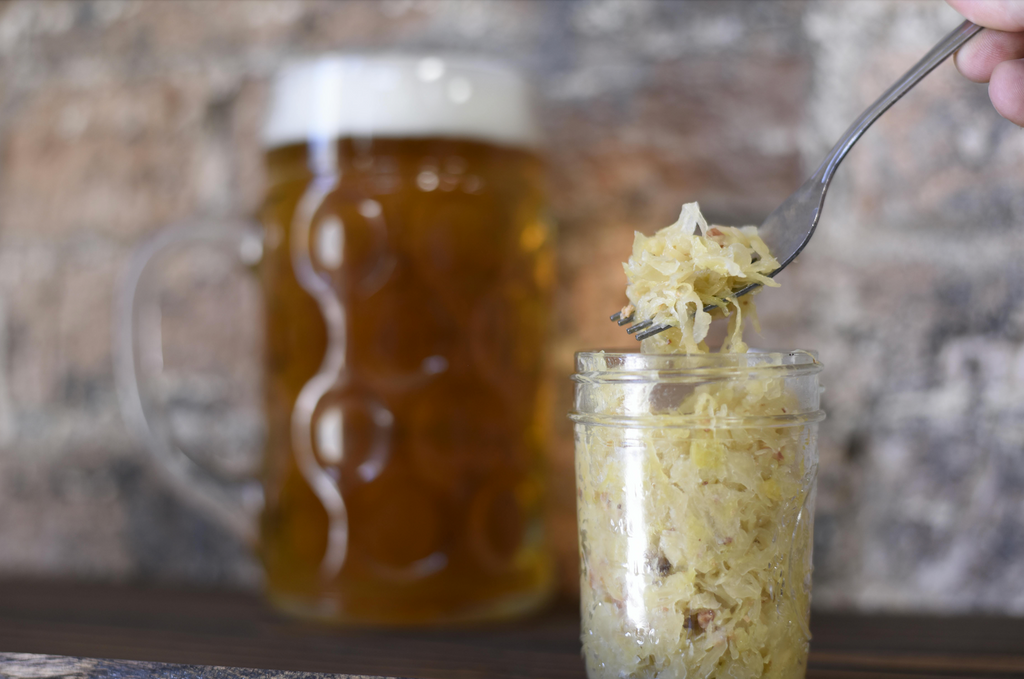From our decade long experience of fermenting, we have learned a few important rules for successful fermentation. Having dabbled with many different types of fermented food, we find that learning to ferment vegetables are a good foundation to master before fermenting everything else. Here are a few rules that we stick by.
First, We Use Organic Food
At Gutsy, we believe in using certified organic or chemical free produce when crafting our fermented vegetables. The thought of consuming more chemicals than necessary is not appealing. At Gutsy, our family members are our first and best taste tasters. This panel of little judges come with brutal honesty which has allowed us to develop many delicious ferments. Making sure our ferments taste good is the key to encouraging young ones to eat and enjoy fermented vegetables. It’s very important to us that we only produce food that we want to eat ourselves. More importantly, food thaty we want to feed our family. It is clear to us that using “chemically grown “vegetables is not beneficial for the earth, the nutritional value of the vegetables, the fermentation process or us. We’ve written more of our thoughts on organic produce here.
Second, We Use Locally Grown Vegetables
It is also important to us that we know our farmers. We like to know the face and story behind the fresh produce we receive. Building a direct relationship with farmers helps their financial stability, reduces wastage, provides seasonally fresh veggies and keeps food mileage down.
Fermentation also locks in many of the nutrients that already exist in vegetables while making those nutrients more bioavailable. We want our vegetables to be as fresh as possible when they arrive.
At Gutsy we ferment (literally) tonnes of vegetables every year. It’s important for us to make sure that we are supporting our local farmers here in Australia. We also want to keep the food kilometres down. Our commercial kitchen is based in Brisbane. We don’t want to buy vegetables from overseas or far flung states and have our vegetables travel thousands of kilometres, using many litres of fuel in the process. Whenever we can we buy local, QLD or NSW veggies. Sometimes we have to go further afield, especially when it’s very hot and dry in QLD and NSW. Only 100% Australian produce is used to make our Gutsy Products.
Third, We Ferment Wildly
Wild fermentation is the process of allowing all the locally sourced, naturally existing bacteria that live on and in and around our vegetables, to multiply and propagate. Some people say that you need to add a starter culture to vegetables before fermentation; but that’s not true! People have been wildly fermenting for thousands of years, and it’s worked for the just fine. There are also many benefits to wildly fermented vegetables over vegetables fermented with a start culture. For example:
- Each batch of wild fermented vegetables has slightly different strains of bacteria depending on:
- Where the vegetables are grown.
- When vegetables are harvested.
- The weather while vegetables are growing.
- Many other factors.
- Wild fermentation produces different flavour variations depending on the bacteria strains that exist on the vegetable. It’s great to have subtly different (and usually delicious) flavours in each batch of fermented vegetable.
- Wild Fermentation will usually produce longer longer strains of bacteria than artificially cultured vegetables. Vegetables will best feed the bacteria that naturally live on that vegetable. Here’s an example: If you use milk whey (for example) to culture your sauerkraut, the bacteria from the milk whey don’t survive long. Who knew that bacteria in milk whey don’t naturally feed on cabbage?
It’s important, for wild fermentation, to make sure that your veggies are chemical free or organic. This is because both fertilisers and pesticides can dramatically affect the bacteria that live on vegetables. Artificially fertiliser, when its applied to soil, can dramatically decrease the number of bacteria that exist in the soil. Bacteria in the soil are quite important as vegetables get their initial bacteria from the soil in which they’re grown.
Fourth, We Ferment in Oak Barrels
We love oak barrels for so many reasons. Only oak barrels are used as the container to ferment vegetables. We believe that oak barrels are the the best vessel we can use to ferment vegetables. Oak barrels are chemical free, sustainable and create some great flavours.
During fermentation, vegetables will often get very acidic. Depending on time, temperature and levels of carbohydrates, vegetables can achieve a pH of 3.5-3 during fermentation. Vegetables fermented in plastic, poor quality stainless steel, or even ceramic crocks with the wrong type of glaze, can problematic.
Imagine our acidic vegetables sitting in a plastic, poor stainless or wrong ceramic container. After 3-4 weeks of fermenting the flavour is noticeable, what about the chemicals? Fermenters have been using oak barrels for thousands of years for sauerkraut. Oak barrels are great as they contain no artificial chemicals. Oak only produces lovely flavours.
Fifth, We Long Ferment our Vegetables
At Gutsy we ferment our vegetables for a minimum of 2 weeks (up to twelve months). Many other sauerkraut companies ferment their veggies for 3-5 days, which is much easier and allows for more profitable turnover. Long fermentation is important to us because:
- Nutrients in the vegetables are made more bioavailable.
- Bacteria have more time to multiply.
- The final flavour has much more depth and complexity.
How long do you ferment your veggies for?
Why we Ferment This Way
At Gutsy Ferments we want the best for our children and the best for you. We produce food the best way we know how. All our methods of fermentation are based on natural, time-proven methods. We ferment organically with local produce, wildly and in oak barrels for a long time. This is what we love.




